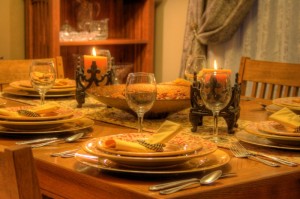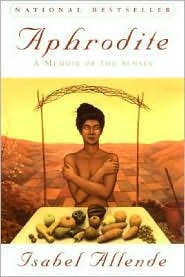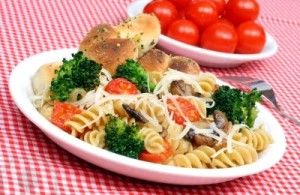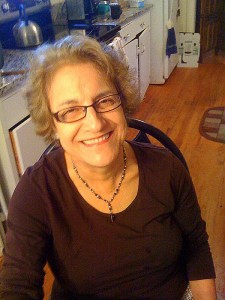Read Part 1 of my interview with Barbara.
 AL: In what way do you believe food memoirs can inspire?
AL: In what way do you believe food memoirs can inspire?
BFW: Food memoirs might inspire readers to a greater understanding of individuals and families of different cultural backgrounds. These memoirs, which often have elements of the travel narrative in their discussions of food, might encourage readers to take up new adventures and meet different kinds of people, even to travel to different cultures. And food memoirs might encourage a greater respect for farmers and for gentler treatment of the earth. They might encourage readers to take the time to cook, to eat better food (not necessarily lower-calorie dishes, however), and to make the effort to connect more often with family and friends over a nice supper. Food memoirs, because they give glimpses of family lives, might inspire readers to more introspection and understanding of how they interact with members of their own families.
AL: Your classes sound fun as well as educational, sometimes blending the study of culinary memoirs with tasting sessions. Beyond the pleasure of breaking bread with your students, is there a lesson in this?
BFW: I think that students can learn how good some of the descriptions of food are by tasting the dishes. Perhaps they also experience first-hand the pleasures of the table, of connecting with people over food. It does change the dynamic of the students’ interactions and create a friendly atmosphere at the end of the term when they gather at my home. Maybe eating together might allow them to remember their fellow classmates, the course itself, and specific memoirs more vividly and for a longer period of time.
AL: I am intrigued with observations in your article about the erotic aspects of the food memoir. Can you elaborate?
 BFW: Anyone who has been entertained by that scene in the film Tom Jones where Tom and the woman who dines with him flirt with each other and stare into each other’s eyes as they consume large hunks from huge drumsticks knows that the sensual delights of food and drink go together with seduction and sex. Lots of other films (like Water for Chocolate, etc.) depict the connection too. Isabel Allende’s book Aphrodite, about food, sex, and the senses, also attests to the connection. Passion for food and exuberant feelings of pleasure while eating and drinking well can set the mood for a sexual encounter. Ruth Reichl admits in Tender at the Bone that food is how she seduced and won her husband Doug. She’s also great at describing her virginal experiences with paté, brie, and other French delicacies at the home of a French-Canadian classmate during high school; the classmate’s father, a gourmand, becomes her mentor. She describes herself as flushing and feeling tingling of the neck (and other erogenous zones?) when she experiences these foods. Nigel Slater also links food and sex (especially steak) in descriptions of his summer job at a restaurant and sexual encounters with a co-worker out back. In general, food becomes a good way for human beings to connect, on many levels.
BFW: Anyone who has been entertained by that scene in the film Tom Jones where Tom and the woman who dines with him flirt with each other and stare into each other’s eyes as they consume large hunks from huge drumsticks knows that the sensual delights of food and drink go together with seduction and sex. Lots of other films (like Water for Chocolate, etc.) depict the connection too. Isabel Allende’s book Aphrodite, about food, sex, and the senses, also attests to the connection. Passion for food and exuberant feelings of pleasure while eating and drinking well can set the mood for a sexual encounter. Ruth Reichl admits in Tender at the Bone that food is how she seduced and won her husband Doug. She’s also great at describing her virginal experiences with paté, brie, and other French delicacies at the home of a French-Canadian classmate during high school; the classmate’s father, a gourmand, becomes her mentor. She describes herself as flushing and feeling tingling of the neck (and other erogenous zones?) when she experiences these foods. Nigel Slater also links food and sex (especially steak) in descriptions of his summer job at a restaurant and sexual encounters with a co-worker out back. In general, food becomes a good way for human beings to connect, on many levels.
AL: One of our family jokes is that one of my teenage sons remembers everything that ever happened to him—and I mean everything—in terms of the food he ate (or didn’t get to eat). We’ll say, “Do you remember the Renaissance Fair, with all the costumes and knights in armor and stage shows and …” And he’ll say, “Oh yeah, that’s where I ate that smoked turkey leg.” Do you believe some people lean more toward this sort of memory than others, and if so, why?
BFW: Interesting question—and I can relate to your son! I think it may be a learned behaviour if your family values and talks about food experiences, and if you all reinforce with positive feedback family members’ conversations about food memories. But it may also be about the workings of the brain, especially the limbic system, next to the olfactory sense mechanism and also next to the memory centre of the brain. I’m not a neuroscientist, obviously, but I’ve read a bit about this, especially in the first chapter of Paul John Eakin’s book on autobiography, How Our Lives Become Stories: Making Selves.
AL: You’ve mentioned a few of your favourites here already, but what culinary memoirs do you particularly recommend, and why?
 BFW: I would recommend Reichl’s Tender at the Bone for its humour, its evocation of the 1960s and 1970s and the food revolution, its terrific characterizations, especially of her mother and Nick, the commune guy in California, and for its erotic, precise descriptions of food. And The Language of Baklava, by Diana Abu Jaber, is a particular favourite of mine, for its depictions of her father Bud and Auntie Aya, for its representations of life and food in Jordan (especially among her Bedouin relatives), for the development of its themes about immigration and life in the diaspora, and for her humour. Toast, by Nigel Slater, which we’ve discussed, would be another recommendation, for its frank depiction of his dysfunctional family, for his representation of the creation of an alternative family in the food world, for his portrayal of Britain in the 1950s and 1960s, for his brilliant descriptions of food, and for his sharp humour. I also like to recommend My Life in France because Julia Child is a cultural icon, because she charts the history of the coming of real French food to America, because of her political opinions, because of her portrayal of her husband Paul, because her book is a beautiful paean to France, because of her meticulous discussions of food experiences and food memories and food preparation, and, finally, because of her humour.
BFW: I would recommend Reichl’s Tender at the Bone for its humour, its evocation of the 1960s and 1970s and the food revolution, its terrific characterizations, especially of her mother and Nick, the commune guy in California, and for its erotic, precise descriptions of food. And The Language of Baklava, by Diana Abu Jaber, is a particular favourite of mine, for its depictions of her father Bud and Auntie Aya, for its representations of life and food in Jordan (especially among her Bedouin relatives), for the development of its themes about immigration and life in the diaspora, and for her humour. Toast, by Nigel Slater, which we’ve discussed, would be another recommendation, for its frank depiction of his dysfunctional family, for his representation of the creation of an alternative family in the food world, for his portrayal of Britain in the 1950s and 1960s, for his brilliant descriptions of food, and for his sharp humour. I also like to recommend My Life in France because Julia Child is a cultural icon, because she charts the history of the coming of real French food to America, because of her political opinions, because of her portrayal of her husband Paul, because her book is a beautiful paean to France, because of her meticulous discussions of food experiences and food memories and food preparation, and, finally, because of her humour.
AL: What advice would you offer to a writer who wants to craft a food memoir a) for family, b) for publication?
BFW: My main advice for a writer crafting a food memoir for family would be to have that writer interview family members for their recollections about significant family recipes and specific memories of shared meals. I would also suggest that the writer focus on a specific relationship with one other family member in which food figures prominently. Then create a vivid portrait of this significant person while also tracing the story of your own development and coming-of-age. For publication, I would want the writer to be concerned with creating an entertaining and likable voice, one that is trustworthy. And I think a plot line is important, as well as vivid characters: it should read like a novel.
AL: “The representation of memories in these life stories is artful and purposeful rather than simply an attempt to capture past reality on paper,” you write. You go on to describe this as a “conscious refashioning” of memories—something we both know all memoirists do to a greater or lesser degree. Where do you feel authors should draw the line?
BFW: I am pretty comfortable with the notion that lots of fictionalizing goes on in constructing a memoir in order to make it interesting and readable (Reichl says as much in the preface to Tender at the Bone); selectivity is essential: selection of recalled events and people, for example. Dialogue also has to be made up, in part at least, especially in scenes from the author’s distant past. And for a lively narrative, I feel that events and minor characters in a memoirist’s life can be conflated or blended together; switching less important events around chronologically for a better “plot” is fine with me too. But I do expect the memoirist to offer us memories of important shaping experiences as fully and with as much emotional truth as possible—the “felt truth” or truth as the memoirist experienced it, with all of its subjective complexity.
AL: Brillat-Savarin wrote, “Tell me what you eat: I will tell you what you are.” What are your top three favourite foods? And what would your cooking and eating preferences tell us about you?
 BFW: This is the hardest question you’ve asked! I guess I would have to name the following: fresh pasta dishes of all kinds, especially with lots of vegetables, fresh basil, and some shaved parmesan; dark chocolate, either naked or in my friend’s chocolate bourbon pecan pie (it wouldn’t be Thanksgiving without it); hot, crusty Italian or French bread, dipped in extra virgin olive oil seasoned with freshly ground pepper. Although I am not a vegetarian and enjoy poultry, fish, and, occasionally, steak, I’ve surprised myself by excluding these foods from my list. I guess my top three foods reveal my peasant origins, my love of earthy foods and fresh, easily identifiable flavours. They also say I love social gatherings with fresh, homemade food at the centre. I cook the pasta dishes, but also cook stir-fries with noodles and ethnic foods out of my Eastern European Jewish ancestry. While I really like the Jewish foods, perhaps their familiarity keep them out of my top three favorites, which also suggests that I like to try new and different ethnic foods of all kinds. Cooking and eating new foods are some of my favourite adventures in life, together with travelling, both to sample some of these new foods on locale and to meet other people and experience their cultures first-hand. I’ve travelled in Europe, the Middle East, Central and South America, Australia, and New Zealand: what a joy and a privilege this has been!
BFW: This is the hardest question you’ve asked! I guess I would have to name the following: fresh pasta dishes of all kinds, especially with lots of vegetables, fresh basil, and some shaved parmesan; dark chocolate, either naked or in my friend’s chocolate bourbon pecan pie (it wouldn’t be Thanksgiving without it); hot, crusty Italian or French bread, dipped in extra virgin olive oil seasoned with freshly ground pepper. Although I am not a vegetarian and enjoy poultry, fish, and, occasionally, steak, I’ve surprised myself by excluding these foods from my list. I guess my top three foods reveal my peasant origins, my love of earthy foods and fresh, easily identifiable flavours. They also say I love social gatherings with fresh, homemade food at the centre. I cook the pasta dishes, but also cook stir-fries with noodles and ethnic foods out of my Eastern European Jewish ancestry. While I really like the Jewish foods, perhaps their familiarity keep them out of my top three favorites, which also suggests that I like to try new and different ethnic foods of all kinds. Cooking and eating new foods are some of my favourite adventures in life, together with travelling, both to sample some of these new foods on locale and to meet other people and experience their cultures first-hand. I’ve travelled in Europe, the Middle East, Central and South America, Australia, and New Zealand: what a joy and a privilege this has been!
AL: You’re making me hungry … Have you thought of writing a culinary memoir yourself? If so, what might it be about?
BFW: I have, and the desire to write one is increasing as I get closer and closer to retirement from my teaching career! Some of my food memoir would be a tribute to my maternal grandmother Eva, an immigrant to the U.S. from Romania. I would also focus on my mother Florence: both women were terrific cooks and always encouraged me to watch them work and to participate with them in the kitchen. My grandmother’s dishes were classic Eastern European Jewish ones, while my mother ventured into preparation of other ethnic foods, especially Italian dishes; actually, I would suggest that she was atypical in not succumbing to the convenience foods and food technology in the 1950s (she did like her pressure-cooker, however). I’d have to bring into the memoir my interest in and teaching of multicultural literature, immigrant stories, and food memoirs. And some of my food experiences abroad could come into the narrative too. I haven’t gotten very far with this project yet, but it has given me so much pleasurable food for thought.
 BARBARA FREY WAXMAN earned her PhD in English at The Graduate Center, City University of New York. She is Professor of English at the University of North Carolina Wilmington, where she has taught literature since 1982. Dr. Waxman is the author of two books on literature and aging, and has also edited a collection of essays, Multicultural Literature through Feminist/Poststructuralist Lenses; her essay on Toni Morrison’s novel Beloved appears in the collection. Her essay on the food memoir appears in College English. Her essays appear in book chapters and in such scholarly journals as MELUS and The Gerontologist. Her most recent essay, “Literary Texts and Literary Critics Team Up Against Ageism,” is a chapter in A Guide to Humanistic Studies in Aging, eds. Cole & Ray. Dr. Waxman is currently at work on an essay about food politics and non-food politics in the culinary memoir.
BARBARA FREY WAXMAN earned her PhD in English at The Graduate Center, City University of New York. She is Professor of English at the University of North Carolina Wilmington, where she has taught literature since 1982. Dr. Waxman is the author of two books on literature and aging, and has also edited a collection of essays, Multicultural Literature through Feminist/Poststructuralist Lenses; her essay on Toni Morrison’s novel Beloved appears in the collection. Her essay on the food memoir appears in College English. Her essays appear in book chapters and in such scholarly journals as MELUS and The Gerontologist. Her most recent essay, “Literary Texts and Literary Critics Team Up Against Ageism,” is a chapter in A Guide to Humanistic Studies in Aging, eds. Cole & Ray. Dr. Waxman is currently at work on an essay about food politics and non-food politics in the culinary memoir.
Barbara,
Your interview with Allyson introduced me to memoirs I hadn’t thought of reading before. Knowing the earliest recorded tasks: accumulating food, preparing food, cooking food, blessing food and sharing food helps us understand the rituals and passions that food demands.
Congratulations on your accomplishments. I’ll be interested to read your current essay on food politics and non-food politics in the culinary memoir.
Thanks, Mary. There are indeed some great recommendations here. Some I’ve read, some I now intend to. I’ve always enjoyed culinary memoirs, but after chatting with Barbara I’ll read them in a new way.
This is a wonderful interview! I will certainly be looking at food memoirs and eating experiences past, present and future in a new light.
Thank you, and congratulations to both of you!
Thanks, Linda. You’re right that Barbara’s thoughts on this subject will influence the way we see, and later remember, the sharing of meals. Adding appreciation to something already enjoyable.
Congratulations! That’s a pretty nifty interview. Is it just me, or does that dinner table look familiar?
Hi Edward, I’m glad you enjoyed the interview. That’s not actually Barbara’s dinner table, as you thought — it’s a stock photo — but if it bears any resemblance to hers, I’m going to angle for an invitation!
I’ve always loved food memoirs and have read many. They opened up worlds and ideas I had never given thought to. I have a box full of the Time-Life Cooking series and I always prefered the stories to the recipes. This was an excellent interview and put even more books on my list of ‘things I have to read’.
As I read this, I am struck by the potential of food as a vehicle both to break down barriers between people and at the same time to increase our understanding of ourselves and others. To use a term from the distant past, food seems at times to serve as a kind of “universal solvent” in a strange way. Great job, Dr. Waxman!